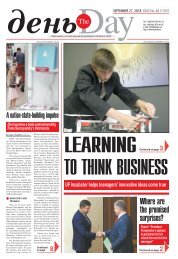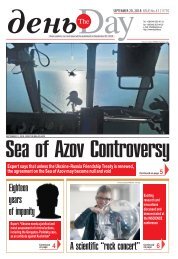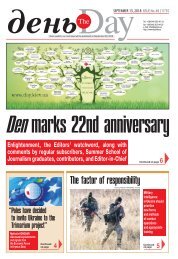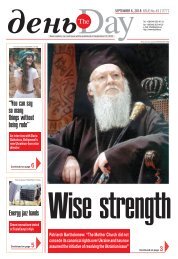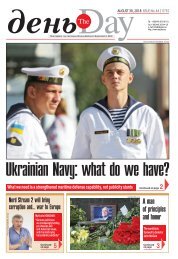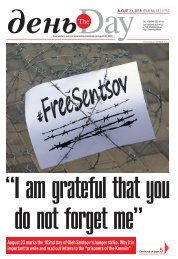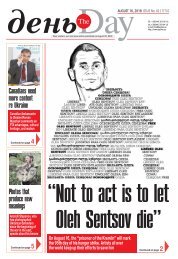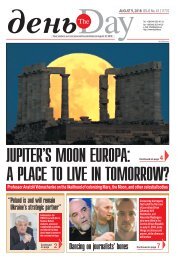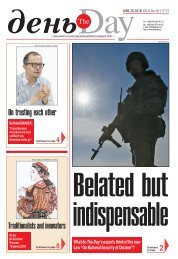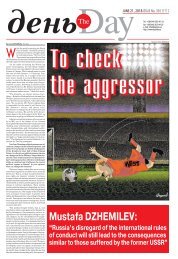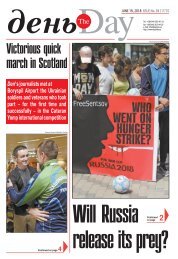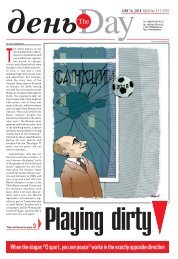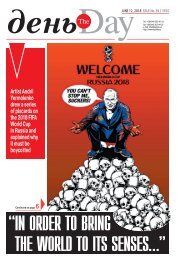#40_1-8
Create successful ePaper yourself
Turn your PDF publications into a flip-book with our unique Google optimized e-Paper software.
WWW.DAY.KIEV.UA<br />
TOPIC OF THE DAY No.40 JUNE 26, 2018 5<br />
a certain European company. This<br />
is an element of security for<br />
Ukraine because it will depend<br />
less on Russia.”<br />
But it is not only about money.<br />
Ukraine insists that Nord<br />
Stream 2 may stop the transit of<br />
Russian gas across our country,<br />
which will give Putin a free hand<br />
for military expansionism in<br />
Ukraine because in this case intensification<br />
of the military conflict<br />
will no longer counter Russian<br />
commercial interests.<br />
“I share your fears that Nord<br />
Stream 2 is intended to hinder the<br />
transit of gas across Ukraine.<br />
Some German publications have<br />
admitted in the past few weeks<br />
that it is not a purely economic<br />
project, as politicians have been<br />
reiterating for years. Merkel said:<br />
yes, there is a political component,<br />
and we will see to it that the<br />
transit of gas through Ukraine<br />
continues. Then Putin said: yes, I<br />
also support this. But these are only<br />
words so far.”<br />
● “THE MORE COMMON<br />
VALUES UKRAINIANS<br />
AND GERMANS WILL<br />
HAVE, THE FASTER<br />
MISUNDERSTANDINGS<br />
WILL BE VANISHING”<br />
Sometimes the impression is<br />
that European politicians and Europeans<br />
in general are taking a superficial<br />
attitude to Ukraine’s<br />
problems and do not want to look<br />
into essential details. This brings<br />
about misunderstandings and tension<br />
where it can be avoided. They<br />
often fail to understand that we<br />
are still halfway on the road the<br />
Western world has already<br />
passed. Do you think this kind of<br />
misunderstanding really exists?<br />
“If you have a goal, you should<br />
approach this goal step by step.<br />
Ukraine is striving for the European<br />
Union, where there are good<br />
living standards, etc. This is what<br />
you, Poles, and other nations have<br />
been aspiring for. Of course, European<br />
institutions, the European<br />
Union, assess one country or another<br />
on the basis of how closely<br />
they have approached their standards.<br />
And it is, after all, your<br />
wish – the wish of Ukraine – to approach<br />
European standards. Economic<br />
development, wellbeing,<br />
adequate administration, transparency,<br />
zero corruption is our<br />
common basis on which we can cooperate.”<br />
In other words, to be better<br />
appreciated by Europeans,<br />
Ukrainians must look more like<br />
Europeans?<br />
“This is an eternal problem<br />
with new candidate countries.<br />
Poland also went through this. If<br />
a country wants to join the European<br />
Union, this does not mean<br />
that the EU will begin to move in<br />
order to meet you halfway. The EU<br />
cannot possibly introduce corruption<br />
or begin to spoil its highways<br />
for the sake of Ukraine. It is<br />
absurd. The European Union is a<br />
set of standards, rules, and values.<br />
If you share these values and introduce<br />
certain standards in your<br />
country, it will mean movement<br />
towards and integration into Europe.<br />
Naturally, the more common<br />
values, for example, Ukrainians<br />
and Germans will have, the faster<br />
misunderstandings will be vanishing<br />
– this will mean that Germans<br />
and Ukrainians trust each<br />
other more and attitudes will,<br />
naturally, also improve. So, I hope<br />
Germans will understand what a<br />
difficult way Ukraine and<br />
Ukrainians had to go and will<br />
highly appreciate it.”<br />
By Volodymyr BOIKO, historian<br />
The Institute of Ukrainian History<br />
of the National Academy<br />
of Sciences of Ukraine and the<br />
Institute of Historical Studies<br />
of the Bulgarian Academy of<br />
Sciences are parties to the signed<br />
agreement. Besides interaction of<br />
these institutions themselves, it seeks<br />
to strengthen Ukrainian-Bulgarian<br />
ties in the areas of science, education,<br />
and culture. First of all, it deals with<br />
the need to create a commission of<br />
Bulgarian and Ukrainian historians,<br />
which should be composed of leading<br />
scholars from both academies, wellknown<br />
students of Bulgarian and<br />
Ukrainian issues, and follow the<br />
example set by the Ukrainian-Polish<br />
body. Unlike the latter, it is unlikely<br />
that the future commission will have<br />
to consider diametrically opposite<br />
views on past events (such differences<br />
just do not exist in this case). At the<br />
same time, such a commission can<br />
become the basis for new contacts.<br />
Developing them, holding scholarly<br />
exchanges and bilateral consultations,<br />
as well as joint conferences, seminars,<br />
summer schools, roundtables, and<br />
documentary exhibitions – all this<br />
forms the next priority set out by the<br />
parties. Likely directions of cooperation<br />
currently include advising<br />
postgraduate students of the other<br />
party as they write their theses, joint<br />
publishing projects, exchanging<br />
research literature, and submitting<br />
articles to the other party’s publications.<br />
The above list is not exhaustive.<br />
Tentative topics of research<br />
projects include: various aspects of<br />
Ukrainian-Bulgarian relations, the<br />
Ukrainian historiography of Bulgaria<br />
and Bulgarian historiography of<br />
Ukraine, research sources available in<br />
both countries, the history of Bulgarian<br />
settlements in Ukraine and<br />
Ukrainian ones in Bulgaria, Ukrainian-Bulgarian<br />
relations within the<br />
international system, and prominent<br />
figures of the shared history.<br />
BulgariaandUkrainein<br />
the history of Europe<br />
The two countries’ institutes of history have<br />
signed a cooperation agreement in Sofia<br />
The signing of the agreement became<br />
possible due to the History of<br />
Diplomacy and International Relations<br />
Scholarly Society initiating the<br />
conference “Bulgaria and Ukraine in<br />
the History of Europe,” which was<br />
held in the Bulgarian capital. Supported<br />
by the Ministry of Foreign<br />
Affairs of Ukraine, the Embassy of<br />
Ukraine in Bulgaria, and other partners,<br />
it became an exceptional phenomenon,<br />
as Sofia had never seen<br />
20 Ukrainian historians visiting at the<br />
same time. As noted at the opening,<br />
the names of Ivan Shishmanov and<br />
Mykhailo Drahomanov are equally<br />
close to the hearts of Ukrainians and<br />
Bulgarians. In recent years, Ukrainian-Bulgarian<br />
relations have been developing<br />
rapidly, increasing the mutual<br />
interest of the two peoples in each<br />
other. The book My Sister Sofia...,<br />
which appeared in Den’s Library series<br />
two years ago, is a manifestation<br />
of this interest, and at the same time<br />
a notable factor in its continued development.<br />
The conference focused on the<br />
events that occurred a century ago and<br />
their long-term effects on the 20th<br />
century. The scholars stressed that it<br />
was incorrect to say that the Ukrainian-Bulgarian<br />
intergovernmental relations<br />
were 26 years old, since they<br />
had actually turned 100, starting<br />
with the signing of the Treaty of<br />
Brest-Litovsk by the Ukrainian People’s<br />
Republic and the Central Powers<br />
alliance, which included Bulgaria.<br />
As Bulgarian scholar Professor Petar<br />
Stoyanovich asserted, it was a just<br />
peace for his country, a thin streak of<br />
triumph ahead of the coming crushing<br />
defeat. By the way, the Bulgarian<br />
scholar is a direct descendant of Minister<br />
Plenipotentiary Ivan Stoyanovich,<br />
who was one of the main negotiators<br />
in Brest-Litovsk.<br />
The unique role of the Treaty of<br />
Brest-Litovsk for Ukraine was emphasized<br />
by Ukrainian historian Professor<br />
Iryna Matiash, who said it offered<br />
a basis for Ukraine’s entry into<br />
the international arena, its effective<br />
legitimization. In her opinion, all<br />
parties involved perfectly understood<br />
others’ objectives and deliberately<br />
agreed to this step to pursue their national<br />
interests. Existing disagreements<br />
led to problems with ratification<br />
afterwards. However, it did not<br />
apply to Bulgaria and Ukraine, as<br />
they quickly exchanged ratification<br />
instruments. When it came to the<br />
appointment of ambassadors, Tsar<br />
Ferdinand insisted that the Ukrainian<br />
side be represented by a well-known<br />
national figure. In the end, Oleksandr<br />
Shulhyn got that job on the advice<br />
of Bulgarian Ambassador Shishmanov<br />
(a student of Taras Shevchenko’s<br />
works and the husband of Drahomanov’s<br />
daughter Lidia). Especially<br />
striking was the spectacular<br />
conclusion of Shishmanov’s speech<br />
during the presentation of his credentials<br />
to Pavlo Skoropadsky, namely<br />
his words: “Glory to Ukraine! Glory<br />
to the Illustrious Lord Hetman!”<br />
That is, the Bulgarian was, at the very<br />
least, very well acquainted with the<br />
situation in Ukraine, so much that he<br />
could take credit for the most famous<br />
Ukrainian slogan.<br />
Bulgarian scientist Blagovest<br />
Nyagulov stressed that the leadership<br />
of the Tsardom of Bulgaria was genuinely<br />
interested in the emergence of<br />
an independent Ukraine, for it offered<br />
Bulgaria a chance to raise the issue of<br />
the status of Dobrogea and some other<br />
areas in the context of the negotiations<br />
in Brest-Litovsk. Indeed, young<br />
Ukrainian diplomats found a common<br />
language with their Bulgarian<br />
counterparts very quickly. The latter<br />
became a sort of intermediaries between<br />
the various involved parties.<br />
One of the negotiators, Minister<br />
Plenipotentiary General Petar<br />
Ganchev, was convinced that the<br />
peace with Ukraine was much more<br />
important than the peace with Bolshevik<br />
Russia.<br />
Another Bulgarian researcher,<br />
Volodya Milachkov, reported on the serious<br />
attention of the Bulgarian media<br />
Photo by the author<br />
SOFIA, BULGARIA. UKRAINIAN HISTORIANS STAND BESIDE THE GRAVE OF MYKHAILO DRAHOMANOV – AN INDIVIDUAL<br />
WHO IS EQUALLY APPRECIATED BY UKRAINIANS AND BULGARIANS<br />
to the Ukrainian issue at that time. According<br />
to available information, the<br />
drafting and signing of the Treaty of<br />
Brest-Litovsk increased the number of<br />
such reports manifold. In addition to<br />
that topic, the Bulgarians were interested<br />
in Skoropadsky’s rise to power,<br />
the relationship between Ukraine and<br />
Russia, the Romanian intervention in<br />
Bessarabia, the relations of Ukrainians<br />
with ethnic minorities (primarily<br />
Bulgarians), the land issue, transportation,<br />
and currency exchange<br />
rates. A separate topic was the reception<br />
of Bulgarian Ambassador Shishmanov<br />
in Kyiv and his Ukrainian<br />
counterpart Shulhyn in Sofia. When<br />
accepting the credentials of the latter,<br />
the head of the Bulgarian state emphasized:<br />
“We know where the soldiers<br />
who died for Bulgaria’s freedom came<br />
from.” This is not surprising, given<br />
the fruitful activities of Ukrainians in<br />
Sofia.<br />
Director of the Institute for History<br />
Studies Daniel Vachkov covered<br />
in his presentation a little-known<br />
page of the history of the First World<br />
War. There was a circle of intellectuals<br />
in Bulgaria who believed that to<br />
prevent future wars in Europe, it<br />
was necessary to create a federation.<br />
Moreover, that process had to unfold<br />
in spatially and temporally distinct<br />
stages. One such stage was to involve<br />
the nations of the Balkans, the<br />
Carpathians, Asia Minor, the Caucasus,<br />
and the northern seaboard of the<br />
Black Sea. That is, Ukraine was to<br />
have a role in it as well. Next, they envisaged<br />
the Teutonic and Scandinavian<br />
federations. In the end, these entities<br />
had to unite in a pan-European<br />
one. However, the Versailles system<br />
laid a completely different foundation.<br />
Only after the horrors of the Second<br />
World War did Europe return to<br />
the idea of unification.<br />
The conference dealt with contemporary<br />
issues as well. I mean, in<br />
particular, the rapid growth of bilateral<br />
trade, a significant number of cultural<br />
and artistic events, and mutual<br />
sympathies among citizens. By the<br />
way, as it turned out, Bulgaria, unlike<br />
Hungary, does not consider the new<br />
Law of Ukraine ‘On Education’ to be<br />
discriminatory. On the contrary, it<br />
emphasizes that the law opens up<br />
new opportunities for studying the<br />
Bulgarian language. Bulgaria supports<br />
the sanctions policy imposed<br />
by the EU in connection with Russia’s<br />
aggression against Ukraine. However,<br />
this position is more clearly defined<br />
at the presidential level. The cabinet,<br />
meanwhile, is more cautious, and<br />
it insists that the sanctions should be<br />
observed as an expression of pan-European<br />
solidarity. The conference<br />
heard alarming data of opinion polls,<br />
showing that 35 percent of the polled<br />
Bulgarians approved the annexation<br />
of Crimea by Russia, 27 percent were<br />
against it, and another 38 percent had<br />
no answer. In general, the pro-Russian<br />
attitude prevalence is estimated at<br />
61 percent. According to the speakers’<br />
observations, the events of recent<br />
years have led, helped by the influence<br />
of Russian propaganda, to an increase<br />
in pro-Russian attitudes in Bulgaria.<br />
At the same time, they made Ukraine<br />
more recognizable among the Bulgarians.<br />
The conference was held on a parity<br />
basis, and both Ukrainian and<br />
Bulgarian scholars spoke there, but<br />
this author considered it advisable to<br />
highlight the Bulgarian side as lessknown<br />
in Ukraine. The gathering of<br />
historians has shown a desire to expand,<br />
diversify, and intensify contacts.<br />
This is all the more important<br />
given the opinion poll data provided<br />
there. For now, after the official closure<br />
of the scholarly forum, Ukrainian<br />
historians visited the grave of<br />
Drahomanov – an individual who is<br />
equally appreciated by Ukrainians<br />
and Bulgarians. He succeeded in significantly<br />
affecting the perception<br />
of Ukraine in Bulgaria in his age. It is<br />
time for us to act now.



